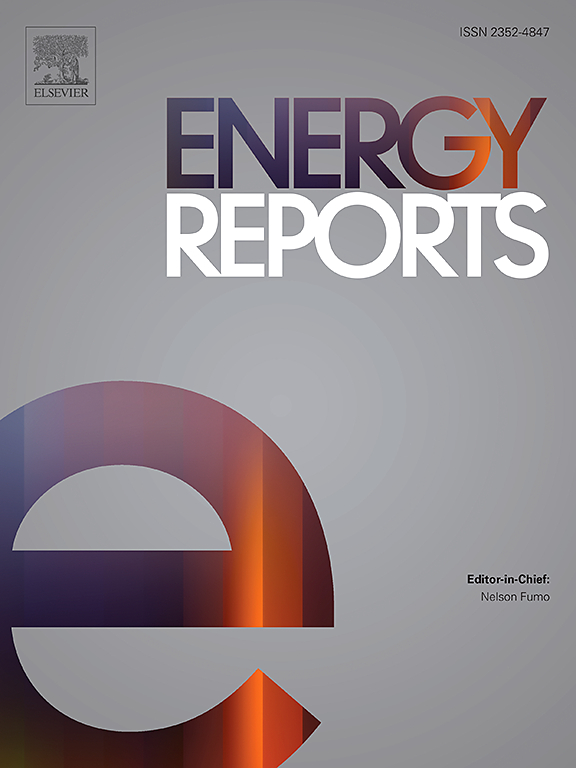以用户为中心的能源管理系统的一种新的多目标方法
IF 4.7
3区 工程技术
Q2 ENERGY & FUELS
引用次数: 0
摘要
日益复杂的微电网管理以及对弹性、可持续能源系统的需求需要超越传统管理策略的解决方案。本文介绍了一种针对微电网和能源社区设计的多目标能源管理系统(MOEMS),强调弹性和可持续性。与传统能源管理系统(EMS)主要关注成本和效率不同,MOEMS采用以用户为中心的方法。它结合了一个涉及所有利益相关者的民主决策过程,实现了根据用户偏好和环境考虑量身定制的个性化能源管理。MOEMS用于解决电力拥塞和电压问题等电网挑战,同时平衡不同利益相关者的目标。将优化问题表述为一个混合整数非线性程序,并采用免费的开源求解器进行求解。提出的框架利用多目标优化模型的结果,允许用户定义他们的偏好。通过指定可接受的解决方案空间,微电网中的中央控制器可以优化操作,同时确保选择的解决方案符合用户的期望。该系统通过仿真和实际微电网案例研究进行了验证,证明了其对不同设置的适应性。为了评估其有效性,将MOEMS与传统的EMS方法进行了比较,包括剖面导向和优先考虑经济和环境因素的方法。Kezo微电网的实时实施进一步展示了其动态管理能源流、满足用户能源需求以及适应供需实时波动的能力。值得注意的是,与传统的EMS方法相比,MOEMS每年可节省22%的电力成本,减少37%的二氧化碳排放。本文章由计算机程序翻译,如有差异,请以英文原文为准。
A novel multi-objective approach to user-centric energy management systems
The growing complexity of micro-grid management and the demand for resilient, sustainable energy systems require solutions that go beyond traditional management strategies. This paper introduces a Multi-Objective Energy Management System (MOEMS) designed for micro-grids and energy communities, emphasizing resilience and sustainability. Unlike conventional Energy Management Systems (EMS), which mainly focus on cost and efficiency, MOEMS takes a user-centered approach. It incorporates a democratic decision-making process that involves all stakeholders, enabling personalized energy management tailored to user preferences and environmental considerations. MOEMS is used to address grid challenges like power congestion and voltage issues while balancing diverse stakeholder goals. The optimization problem is formulated as a mixed-integer non-linear program and adopted to be solved using a free and open-source solver. The proposed framework leverages the results of a multi-objective optimization model, allowing users to define their preferences. By specifying an acceptable solution space, the central controller in the micro-grid can optimize operations while ensuring that the selected solutions align with user expectations. The system is validated through simulations and a real-world micro-grid case study, demonstrating its adaptability to different setups. To evaluate its effectiveness, MOEMS is compared with traditional EMS approaches, including profile steering and methods that prioritize economic and environmental factors. A real-time implementation in the Kezo micro-grid further demonstrates its capability to dynamically manage energy flows, meet user energy demands, and adapt to real-time fluctuations in supply and demand. Significantly, MOEMS achieved up to 22% higher annual electricity cost savings and a 37% reduction in CO2 emissions compared to traditional EMS methods.
求助全文
通过发布文献求助,成功后即可免费获取论文全文。
去求助
来源期刊

Energy Reports
Energy-General Energy
CiteScore
8.20
自引率
13.50%
发文量
2608
审稿时长
38 days
期刊介绍:
Energy Reports is a new online multidisciplinary open access journal which focuses on publishing new research in the area of Energy with a rapid review and publication time. Energy Reports will be open to direct submissions and also to submissions from other Elsevier Energy journals, whose Editors have determined that Energy Reports would be a better fit.
 求助内容:
求助内容: 应助结果提醒方式:
应助结果提醒方式:


